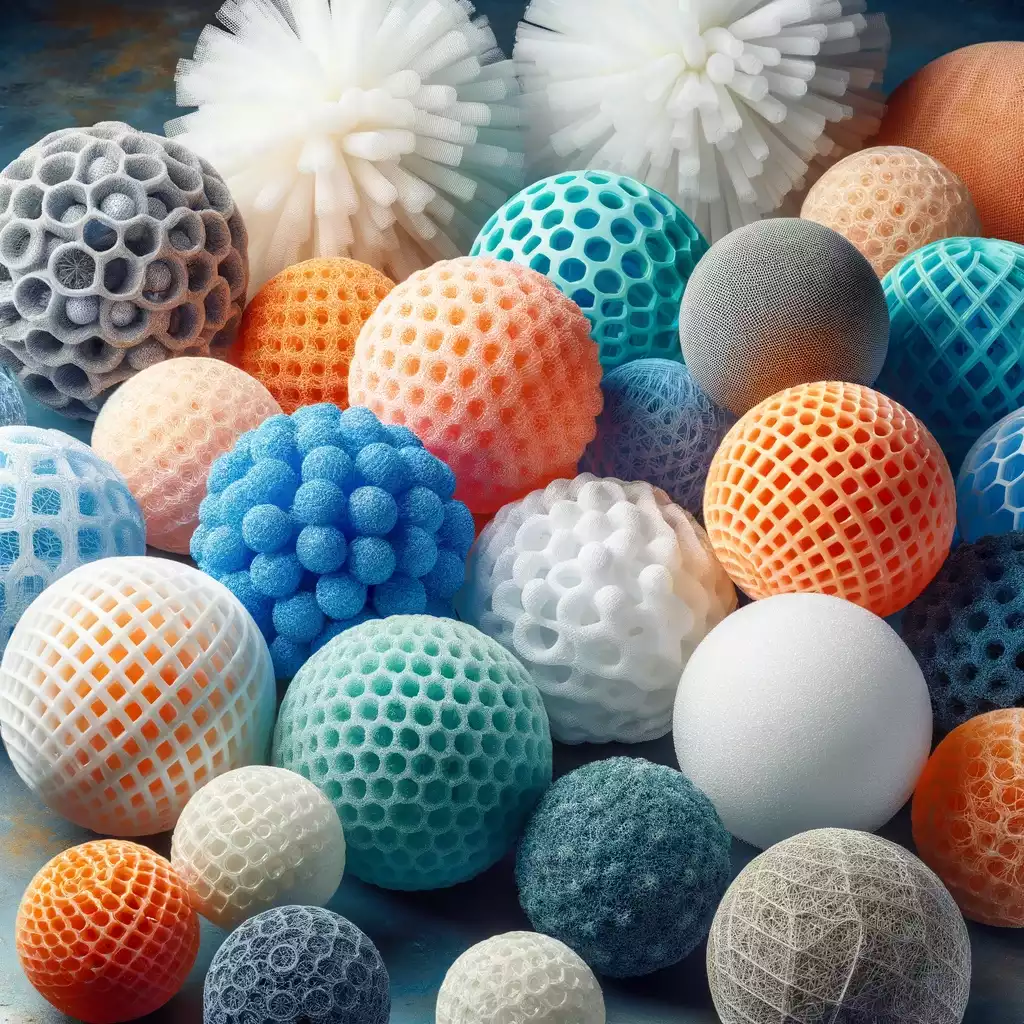In maintaining a clean and healthy swimming pool environment, pool filter balls play a crucial role. They not only ensure the purity of the water quality but also directly affect the lifespan and safety of the pool. However, different types of filter balls have their own characteristics and usage requirements, so understanding how to correctly choose and use these filter balls is extremely important. This article will discuss several key issues that should be noted when using pool filter balls, helping you manage your pool more effectively and ensuring that you and your family can safely and enjoyably experience the joys brought by the pool.
Understanding Different Material Filter Balls

- Polyester Fiber Filter Balls:
- Cleaning Frequency: Polyester fiber filter balls may require more frequent cleaning as they are more prone to being clogged by grease and fine particles.
- Durability: This material is relatively soft and may not be as durable as other materials, requiring regular checks for wear and tear.
- Chemical Reactions: It’s important to be aware of the effects of pool chemicals on polyester fibers, as certain chemicals might reduce their filtering effectiveness or shorten their lifespan.
- Polypropylene Filter Balls:
- Chemical Resistance: Polypropylene material is more resistant to chemicals, but it still needs regular checks for chemical corrosion.
- Large Particle Filtration: This material is more suitable for filtering larger particles and may not be as effective for very fine particles.
- Replacement Cycle: Although polypropylene filter balls are more durable than polyester fiber, they still need to be replaced regularly to maintain optimal filtering effectiveness.
- Glass Fiber Filter Balls:
- Cost and Effectiveness: Glass fiber filter balls are usually more expensive but provide the best filtering effect, suitable for situations with high water quality requirements.
- Durability: This material has higher durability, but still needs regular checks for any signs of damage or wear.
- Fine Particle Filtration: Glass fiber material can effectively filter tiny particles, suitable for pools that require high water quality standards.
The Entire Process of Backwashing Filter Balls
- Record Initial Pressure (PSI): After installing FilterBall, first record the initial reading of the pressure gauge. As the back pressure generated by FilterBall is very small, usually less than 1 PSI, this means that the pressure of the filtering system under normal operating conditions will be relatively low.
- Observe Pressure Changes: In the daily use of the pool, the pressure gauge needs to be checked regularly. When the PSI increases by 5-7 PSI compared to the initial value, it indicates that FilterBall has accumulated a large amount of dirt and needs backwashing.
- Low Frequency Backwashing: Due to the high dirt capacity of FilterBall (more than 20 times that of sand), the frequency of backwashing required is relatively low. For a typical residential pool, backwashing about once a month is sufficient.
- Backwashing Process: When backwashing, do not expect to see a clump of dirt in the sight glass as you would with sand filtration. The dirt release process of FilterBall during backwashing is more uniform.Recommended Backwashing Time: The recommended backwashing time is 2 to 3 minutes. This length of time is sufficient to effectively remove accumulated dirt.
- Medium Residual Dirt: Even after backwashing is completed, there may still be some dirt or large particles remaining in the FilterBall medium. This is normal and indicates that the filtering medium is effectively doing its job.
- Check the Pressure Gauge: After backwashing, the pressure gauge should return to near the original pressure. If the pressure does not significantly decrease after backwashing, this may be a signal that the filter balls need to be cleaned or replaced.
- Time to Replace Filter Balls: Over time, if you find that the startup pressure does not decrease even after backwashing, this indicates that the filter balls may be saturated and no longer able to effectively release dirt. In this case, the FilterBall needs to be cleaned or replaced.
In conclusion, correctly selecting and maintaining pool filter balls is crucial for maintaining water quality in the pool. Whether it’s polyester fiber, polypropylene, or glass fiber filter balls, understanding the characteristics, maintenance requirements, and potential issues of each material can help you better manage your pool. Regular cleaning, inspection, and replacement of filter balls ensure that they are in optimal condition, allowing your pool to remain clean and safe. Remember, a well-maintained pool not only provides a refreshing swimming experience but can also be an ideal place for family and friends to gather.
